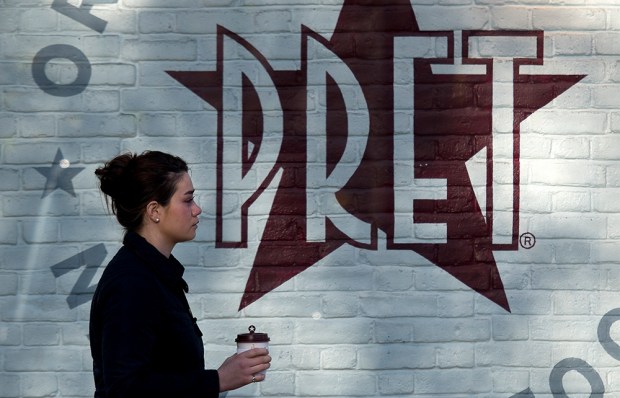‘Always be cheerful’ – a motto to which I’ll return in the final item – speaks to my natural demeanour. But when asked whether I see grounds for optimism in the UK business scene, I’ve struggled lately to find anything positive in the near-certain advent of a Labour government, the agonisingly slow retreat of inflation and the damage of still-rising interest rates. Nevertheless, let me take a step back.
In an ONS survey this month, four times as many respondents (36 per cent) thought their business performance would improve over the next 12 months compared with those who thought it would decline (9 per cent). There were also upticks in expectations for manufacturing output and in consumer confidence. And while food inflation stays sticky (not helped by Russia’s new blockade of Ukrainian wheat), there’s a fair chance that falling energy prices will bring overall UK inflation down to a less strike-provoking 5 per cent by year-end.
As for this week’s headlines about ‘the biggest drop in UK household wealth since the second world war’, they refer largely to falls in bond prices to which most households, I suspect, are oblivious. And house prices – down just £905 last month and still 2.6 per cent higher than in January, according to Rightmove – continue to confound doomsters who cry out for what they seem to think would be a cleansing crash.
So I’m an optimist despite everything? Not quite, not yet. But there’s always two sides to a story.
The last jobber
A salute to Brian Winterflood, the City’s ‘Last Jobber’ – to borrow the title of his biography by Brian Milton – who died last month. Having joined the stock exchange as a boy messenger in 1953, Winterflood became not only one of its pillars but also one of its great democratisers. Born in East Ham with no silver spoons in sight, he decided stockbroking ‘was not for the likes of me’ and became a jobber, or market-maker, initially with the firm of Bisgood Bishop and later under his own name.
In the 1980s he led the creation of the Unlisted Securities Market for smaller company shares – which evolved in 1995 into Aim (the Alternative Investment Market). I have myself described Aim as ‘probably… a more important development’ for London equities than ‘Big Bang’ in the previous decade. In the view of the veteran broker Charlie Peel, co-founder of Peel Hunt: ‘Without Brian, Aim would not have thrived.’ As for Winterflood’s style of business, it was well summed up by another City disruptor, the money broker Michael (now Lord) Spencer: ‘A pretty steely edge with slightly old-world courtesy… A very tough guy, but with charm.’
Save the ticket offices
On the proposed closure of 1,000 railway ticket offices, I find myself agreeing, unusually, with the fashionable capitalist-basher Noreena Hertz, who called it a ‘de-humanising shift’. I speak as one who travels 20,000 miles annually by train and for many years always used ticket offices in preference to machines that baffled me or rejected my credit cards.
At York, I warmed to the Scottish chap with thick glasses who knew the timetable backwards and I recall the Polish manager called Thomas, who came out from behind the counter and drove me to Tesco to buy jump-leads because my car had a flat battery in the car park. At Thirsk, an amiable fellow called Steve plays soothing Baroque music through the tannoy. At King’s Cross, I’d say the chances are 50 per cent helpful response, 50 per cent hostile RMT member who can’t be arsed – but you can’t win them all.
Latterly I’ve mastered the Trainline and Grand Central ticketing websites, probably saving myself £1,000 a year, but that requires online dexterity as well as certainty as to where and when you want to go. Many rail users have neither – and the prospect of sitting in unmanned stations listening to remote cancellation announcements should fill us all with the utmost gloom. The travelling public would be right behind the unions’ call to save ticket office jobs, if only the unions cared a jot for the travelling public.
Handbag madness
If I were a Nile crocodile, I’d be happy to end my days as an Hermès Birkin handbag – one example of which, with diamond and gold fittings, sold at Sotheby’s last year for $450,000. If I were Victoria Beckham, who reportedly owns more than 100 Birkins, I’d be rejoicing at the prediction from Baghunter, a platform for buyers and sellers of rare bags, that Birkins will rise in value ‘eight to ten times’ over the next half-century.
What a mad example of super-rich status-chasing and value-delusion – yet no madder than, say, the market for Damien Hirst’s colour-dot prints (yours on eBay for £28,000) or any art sold as digital ‘NFTs’. And how mean that the house of Hermès, for all the millions it has made out of the late style icon Jane Birkin’s name, paid her an annual royalty of just £30,000 (for 2011, that is, according to Vogue), which she passed on to charity.
Still, at least handbags have functional purpose. If I were still in the pantomime dame business, I’d be happy to have a capacious – and to my eye rather comical – Birkin from which to produce feather dusters and strings of sausages.
Look up, look down
Following my criticism of last week’s dreary Mansion House speeches, here’s a handy tip. A family friend – a second world war Arctic convoy veteran, no less – spoke wittily and well at his recent 100th birthday lunch. When I congratulated him, he said: ‘D’you know who taught me public speaking at petty officer school after the war? It was Lt Philip Mountbatten, before he was Duke of Edinburgh. When you stand in front of an audience, he told us, always remember “ABC-XYZ”. What’s that stands for? Always be cheerful – and examine your zip.’
Got something to add? Join the discussion and comment below.
Get 10 issues for just $10
Subscribe to The Spectator Australia today for the next 10 magazine issues, plus full online access, for just $10.
You might disagree with half of it, but you’ll enjoy reading all of it. Try your first month for free, then just $2 a week for the remainder of your first year.















Comments
Don't miss out
Join the conversation with other Spectator Australia readers. Subscribe to leave a comment.
SUBSCRIBEAlready a subscriber? Log in